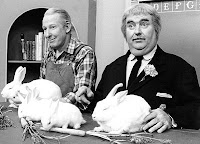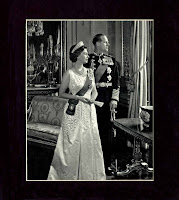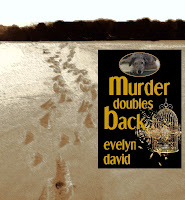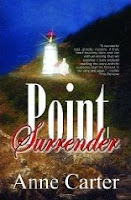Endings
At the Love Is Murder conference earlier this month I listened to Guest of Honor Jeffery Deaver talk about his dislike of writing the wrap-up chapter of his books. You know the chapter – the one that finishes everything off; fills in any gaps; and lets the hero or heroine, if not ride off into the sunset, at least saddle their horses.
I’ve been thinking about endings a lot lately. One of my favorite television shows, Battlestar Galactica, is ending. In an unusual move for Hollywood, the producers/writers have been given time to craft a real ending to the show that’s lasted four seasons. After tomorrow night’s episode, there will only be three episodes left to tell the tale.
Last week’s episode was disappointing to me. One of the supporting cast was lying (maybe dying) in a hospital bed. Besides the normal hand-wringing and emotional angst displayed by his ex-wife and comrades in arms, the dramatic scene was used to relay a great deal of backstory. Without going into a lot of explanation for you poor souls who’ve missed one of the best television series ever, here are the basics.
Caprica (an earth-like planet inhabited by humans) was destroyed by the Cylons. Cylons are an artificial lifeform created by humans to serve humans. The Cylons rebelled and fought a war with the humans, lost, and were banished to space for decades. The first episode of the show begins with the Cylons returning with a bang and killing off all the humans except for a small number of refugees who escaped the nuclear explosions. Among the refugees were; humans aboard a ragtag band of spaceships; retiring, Captain William Adama and his crew of Galactica – a aging combat ship that was being decommissioned and turned into a museum; and Laura Roslin, a midlevel official from the Department of Education. Ms. Roslin, a former school teacher, was on Galactica the day of the attack. She’d been sent to Galactica to give a speech at the museum dedication. She was also trying to deal with the news that she had advanced breast cancer. After the attack, a quick headcount of the government was conducted and guess what? Laura Roslin was next in line for the Presidency. For the next four seasons the survivors have been on the run from the Cylons, who’ve been determined to wipe out the last of the human race. Oh, and one more thing – the Cylons, except for the Centurions (a soldier subspecies called affectionately Toasters), have evolved into creatures that look, talk, and act like humans. So you can’t tell most Cylons from humans and a good number of them have infiltrated the fleet for more than a lifetime – kind of “sleeper” Cylons. But the humans eventually figure out that although Cylons look like humans, there are only a limited number of models. Once you can identify the models, you know the Cylons on sight. That is except for the Final Five Cylons that no one, including the other Cylons, can identify.
So back to my writing related point – you probably thought I didn’t have one – the guy in the hospital bed has recently discovered that he’s one of the Final Five Cylon models. Poor guy always thought he was human. As a result of his combat injury many suppressed memories are coming back; important memories about the Final Five and the history of the Cylon race. In between medical procedures and during brief periods of lucidity, he related these memories to the ones around his bedside and to the viewing audience. This moment was where I found myself losing interest in the episode. If the deathbed dialogue had been in a manuscript for a novel, my editor would have red-penned most of it with the note, “too much telling and not enough showing.” It was as if the writers decided to make up a huge, elaborate backstory at the last minute and dump it on the audience in exposition form. In my book, pun intended, that’s cheating. It might be easier for the writers and save oodles of time, but it invariably disappoints the viewers/readers. Just as my description of 80 some odd episodes of Battlestar Galactica were condensed to a paragraph or two above, telling instead of showing should always be the last resort. (i.e. You should watch the show! Rent or buy the dvds.)
When you write or read the last chapter of a book, do you want a full recap? Should one be necessary if the rest of the book is well-written? I absolutely know that very little “new” information should be revealed in the last chapter. As with the Battlestar Galactica episode, too much new information at the end of the story makes the reader feel cheated. Why pay attention to all the details throughout the story, if at the end, none of it gave you an opportunity to figure out the mystery for yourself?
So to recap – yes, I’m smiling here but note that I’m not going to give you any new information – your final chapter should be one that ties up the loose strings, makes sense of the clues, and gives the reader a view to the future lives of the characters. Build the backstory into middle of the book – don’t “tell” it in the reveal at the end. In fact try to “tell” very little of it at all. “Show” it!
Evelyn
http:www.evelyndavid.com







Evelyn, I’m all for “show, don’t tell” as much as possible throughout a novel. It’s so tempting to want to explain things rather than write active scenes, and I’m still learning how to do it well. My editor for my YA series has thumped me on the head (okay, figuratively speaking!) numerous times for copping out and telling rather than showing. I feel like I’m a better writer for that, though it is tough sometimes. I just critiqued sample chapters for another writer, and I found lots of telling but little showing. I delicately explained it’s much easier for the reader to feel connected to the main character if they’re going through things with her, rather than having the protag constantly explain about her past (recent and distant). Passive gets boring. Active engages. This writer didn’t take my advice kindly and sent me a long email telling me how wrong I was. Oh, well, I tried. As I write THE COUGAR CLUB now, I work hard to stay in the moment. It’s nice to know that even Jeffrey Deaver has to remind himself when wrapping up a novel that ’tis better to show than tell!
I think what happens to a lot of authors is they are so eager to tell the story they gloss over what should be shown–I know I do that when I first start writing a new book.
Because I know what’s going to happen in the end, I’m anxious to get there.
Marilyn
What’s criminal about the Galactica info-dump is the fact that it sounds like they had enough material to do several more episodes — which their fans would surely love — but were given only one in which to tell it all. Also, obviously, it’s usually so much easier to “show” in a visual medium such as TV or film; it’s a shame for writers to resort to the “tell” in this case.
I’m no different, I find myself backspacing out a lot of descriptive info and scratching my chin about how to best make it come alive instead. We often don’t even realize we are doing it.
The wrap up chapter should actually be fun to write, and if the author has done a good job with all the other chapters, there really shouldn’t be much to “wrap up” — although some do use this spot to plant the teaser for the next book in a series.
Anne
http://beacon-street.blogspot.com
I vote no, no, no on doing wrap up chapters. Remember, some of the television series impetus for this is the multi-year run of a series with large hiatus gaps mixed in. Reading a book is a different in timing.
And, on the snarkier side: I do think that it is a mark of quality writing to not have to “remind” readers about characters and story gone by to make the ending acceptable or even comprehensible! If you need to re-cap, it means you did a crappy job along the way. This is not off the cuff work, it’s hard-earned crafting of a story. You have the time to do the work well. If you ever feel the need to recap, you’d better just go back into revision mode and find what needs fixing in the pages that came before.
That’s my view as a writer. As I reader, if I see a recap before me, I think oh-oh. Then, I feel like the author must think I’m stupid if they figure that I came this far and am too confused to move on. Seriously, if the book wasn’t working for me because of such expository flaws, then I stopped reading it long ago and a re-cap ain’t gonna help!